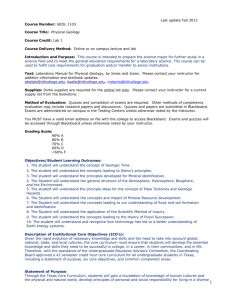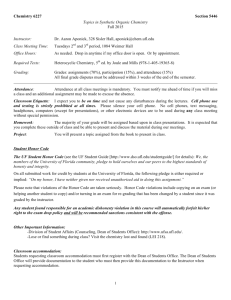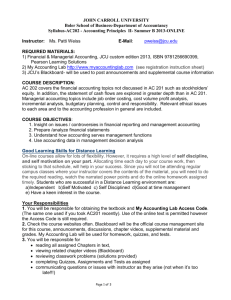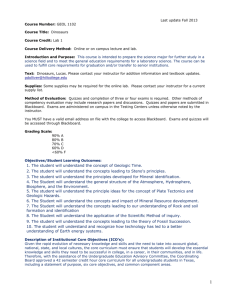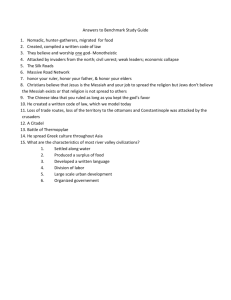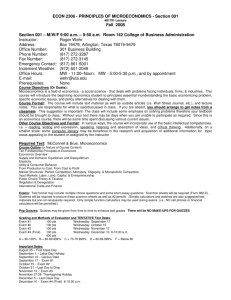ACCT 225 - Darla Moore School of Business
advertisement
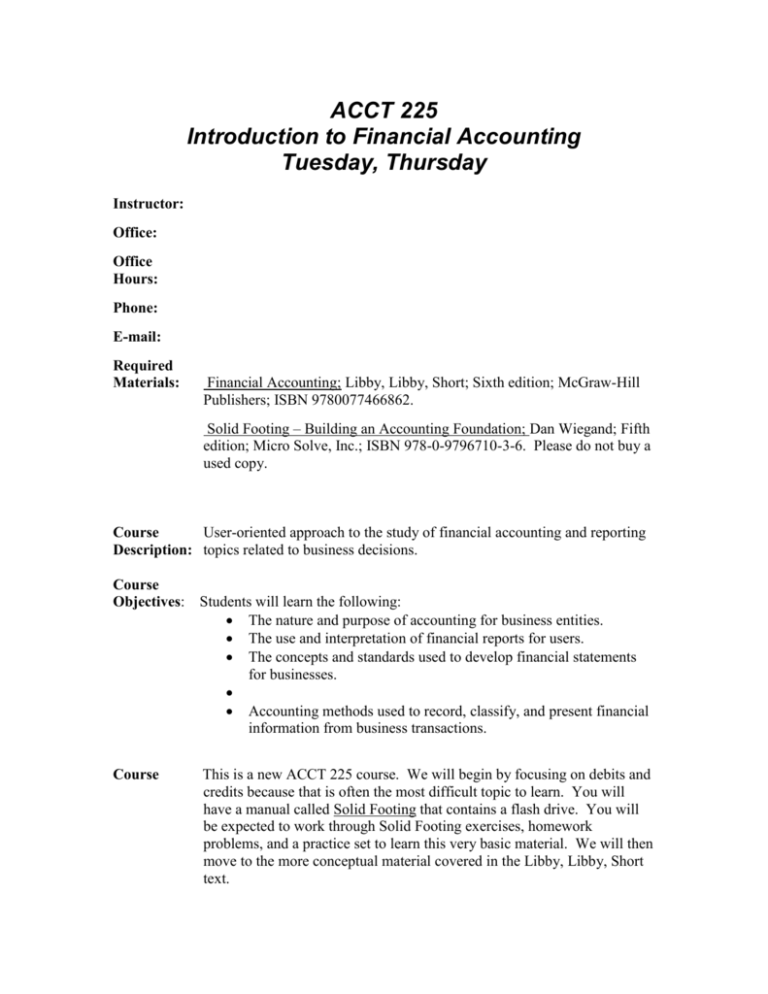
ACCT 225 Introduction to Financial Accounting Tuesday, Thursday Instructor: Office: Office Hours: Phone: E-mail: Required Materials: Financial Accounting; Libby, Libby, Short; Sixth edition; McGraw-Hill Publishers; ISBN 9780077466862. Solid Footing – Building an Accounting Foundation; Dan Wiegand; Fifth edition; Micro Solve, Inc.; ISBN 978-0-9796710-3-6. Please do not buy a used copy. Course User-oriented approach to the study of financial accounting and reporting Description: topics related to business decisions. Course Objectives: Course Students will learn the following: The nature and purpose of accounting for business entities. The use and interpretation of financial reports for users. The concepts and standards used to develop financial statements for businesses. Accounting methods used to record, classify, and present financial information from business transactions. This is a new ACCT 225 course. We will begin by focusing on debits and credits because that is often the most difficult topic to learn. You will have a manual called Solid Footing that contains a flash drive. You will be expected to work through Solid Footing exercises, homework problems, and a practice set to learn this very basic material. We will then move to the more conceptual material covered in the Libby, Libby, Short text. 2 There is a very high failure/withdrawal rate in this class. The best way to succeed is to attend class and do the homework. Thus, the maximum number of absences is three for the TTh sections and five for the MWF. Your final course grade will be decreased by 1 point for each absence after that. Please be advised that an absence is an absence – there are no excused absences. Any unforeseen emergencies will be dealt with on a case by case basis. Any exception to this attendance policy is at the discretion of the instructor (not the student) and will be granted only in the event of sincere emergencies. Appropriate documentation will be required to support emergencies. It is your responsibility to keep up with the number of your absences. Homework: Completing homework is essential for success in this course. You are expected to read the chapter before the class meeting and complete the homework when assigned, not right before the test! Blackboard: I will provide important information and course materials to you through Blackboard. It is your responsibility to check your e-mail address on Blackboard and change it if it is not your preferred e-mail address. To change your e-mail address, login to Blackboard and then go to personal information. Practice Set: Your Solid Footing text contains a practice set that will count 15% of your grade. It will be due on February 17 in class. You will lose 1% of the grade for every day after that. Exams: The test schedule will be: Exam 1: February 22 Exam 2: March 31 Final Exam: April 29 at 9:00 am for the 8:00 TTh section May 2 at 2:00 pm for the 9:30 TTh section The final exam will be comprehensive, covering all the material covered during the semester. 60% of the final exam will come from new material. No makeup exams will be given and a missed exam will generally result in a grade of zero. In the case of unforeseen emergencies, your final exam grade will be weighted for the missed test. This exception is at the discretion of the instructor (not the student) and will be granted only in the case of sincere emergencies, not for convenience. Appropriate documentation will be required to support emergencies. 3 There will be six quizzes each worth three percentage points. Of these, you can earn a maximum of fifteen percentage points. There will be no make-ups for the quizzes. That is why we will give eighteen points worth of questions but only allow a maximum of fifteen points to be earned. Simple four-function calculators may be used on exams and quizzes, but no graphing calculators, financial calculators or calculators that use text. Cell phones must be placed at the front of the room during all exams. Grading: Your grade for the course will be computed as follows: Exam One Exam Two Cumulative Final Exam Quizzes Practice Set 20% 20% 30% 15% 15% The grading scale will be: A B+ B C+ C D F 89.5-100 86.5-89.49 79.5-86.49 76.5-79.49 69.5-76.49 59.5-69.49 Below 59.5 The grading scale is set by the School of Accounting and your instructor will not be able to make any changes in it. There will be NO deviations from the grading scale. A grade of D+ is not awarded in this course. Any business major scoring a D or F must retake the course. Supplemental Instruction: Supplemental Instruction (SI) is offered for this course and provides you with the opportunity to attend three (3) study sessions per week. SI sessions for your class will be facilitated by an undergraduate student who has taken this course and excelled in the course material. During these weekly sessions, your SI leader will facilitate activities that encourage you to practice, discuss, and ask questions about the most recent lecture material. These sessions will not take the place of your classroom session. All SI sessions are held in the Student Success Center, Thomas Cooper Library 4 Students with Disabilities: If you have a documented disability for which you need special arrangements, please contact Disability Services, located in LeConte College, Room 112, Phone 777-6142. Disabled students needing extra time during tests must give their instructor documentation at the beginning of the semester. To be given extra time, a student must take the test through disability services and must take it no later than the rest of the class. Extra time cannot be given to any student in the full class with the other students. Please make your appointments with disability services following their rules. USC Honor Code: It is the responsibility of every student at the University of South Carolina Columbia to adhere steadfastly to truthfulness and to avoid dishonesty, fraud, or deceit of any type in connection with any academic program. Any student who violates this Honor Code or who knowingly assists another to violate this Honor Code shall be subject to discipline. This Honor Code is intended to prohibit all forms of academic dishonesty and should be interpreted broadly to carry out that purpose. The following examples illustrate conduct that violates this Honor Code, but this list is not intended to be an exhaustive compilation of conduct prohibited by the Honor Code: 1. Giving or receiving unauthorized assistance, or attempting to give or receive such assistance, in connection with the performance of any academic work. 2. Unauthorized use of materials or information of any type or the unauthorized use of any electronic or mechanical device in connection with the completion of any academic work. 3. Access to the contents of any test or examination or the purchase, sale, or theft of any test or examination prior to its administration. 4. Use of another person’s work or ideas without proper acknowledgment of source. 5. Intentional misrepresentation by word or action of any situation of fact, or intentional omission of material fact, so as to mislead any person in connection with any academic work (including, without limitation, the scheduling, completion, performance, or submission of any such work). 6. Offering or giving any favor or thing of value for the purpose of influencing improperly a grade or other evaluation of a student in an academic program. 7. Conduct intended to interfere with an instructor’s ability to evaluate accurately a student’s competency or performance in an academic program. Whenever a student is uncertain as to whether conduct would violate this Honor Code, it is the responsibility of the student to seek clarification from the appropriate faculty member or instructor of record prior to engaging in such conduct. Suspected violations of the honor code will be reported to the Office of Academic Integrity. Violations of the honor code will result in disciplinary measures. 5 Sanctions will be imposed to the fullest extent possible for any student who participates in any act of academic dishonesty. 6 Date – Chapter Homework-Text Tues/Thurs in Text 1/11 1/13 1/18 1/20 Chapter Homework- Handout in SF Solid Footing Pgs 3-10 1-1 Accounting equation Pgs 10- 2-1 T22 Accounts for Assets and Liabilities Ch 3 & 3-1, 4-1 T4 Accounts for Revenues and Expenses Ch 5 5-1 1/25 1/27 Ch 2 E2,3,8 P3(1-4),5(1-3) 2/1 2/3 Ch 3 E3,6,7,10,11 P1,2,4(1-3) Ch 6 6-1 2/8 2/10 Ch 4 E1,6,16,18 P7,8 Ch 7 & 8 Ch 9 & 10 Practice Set Due 7-3 & 8-2 2/15 2/17 Ch 1 2/22 2/24 Test one Ch 6 3/1 3/3 3/8 3/10 3/15 3/17 Ch 7 & App. B &C Break Break Ch 7 Ch 8 E1,7,11 P1,3 9-1 & 10-1 Practice Set Due E6,13,16,18,20 P1,2,7 E1,2,3,5,10,11,13,17,19 P3,5,6,11 E1,6,7(a&b),11,14,17 P1,6,10 Straight-line and Units of Production only Periodic and Perpetual Journal entries 7 Date – Tues/Thurs 3/22 3/24 Chapter Homework-Text in Text Ch 8 Ch 9 M1,2 E1,3,4,15,16,22,25 P3,7,11,12 3/29 3/31 4/5 4/7 4/12 4/14 4/19 Ch 10 Ch 11 4/21 Ch 12 (pgs. 609614) Ch 13 4/29 9:00 5/2 2:00 1/2/11 Test 2 (Ch 6, 7(including App. B & C), 8 and 9) E1,4,9,11,15 P7,12 E2,3,4,5,8,11,16 P1,5 E3,4,5,6 E1,7,14,17(1) P1,3 Cumulative final for the 8:00 TTh class to be given at 9:00 am Cumultive final for the 9:30 TTh class to be given at 2:00 pm Chapter Homework- Handout in SF SF 8 9

